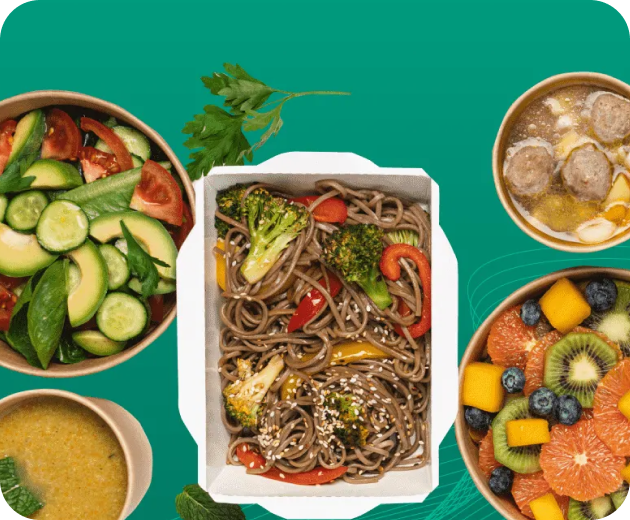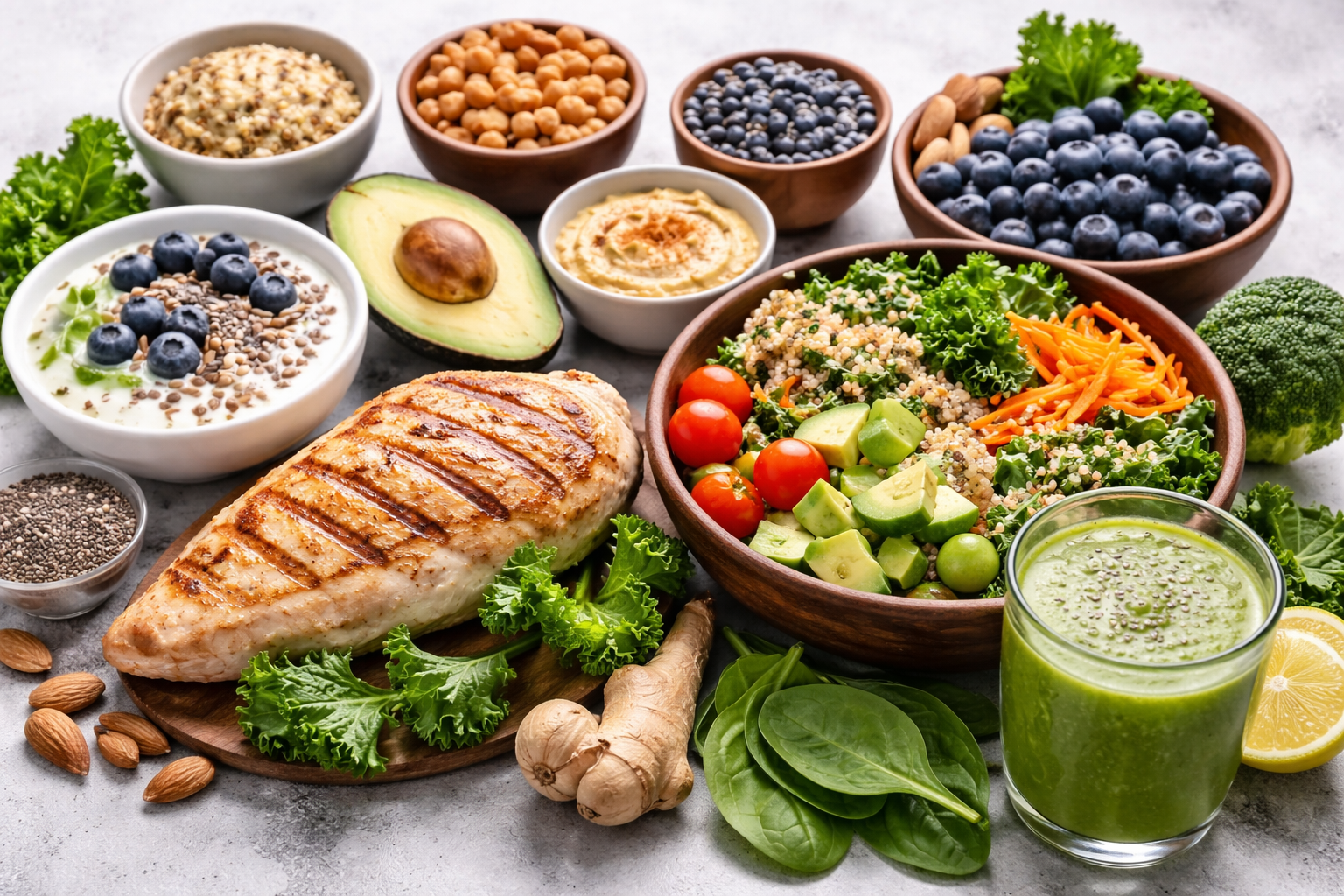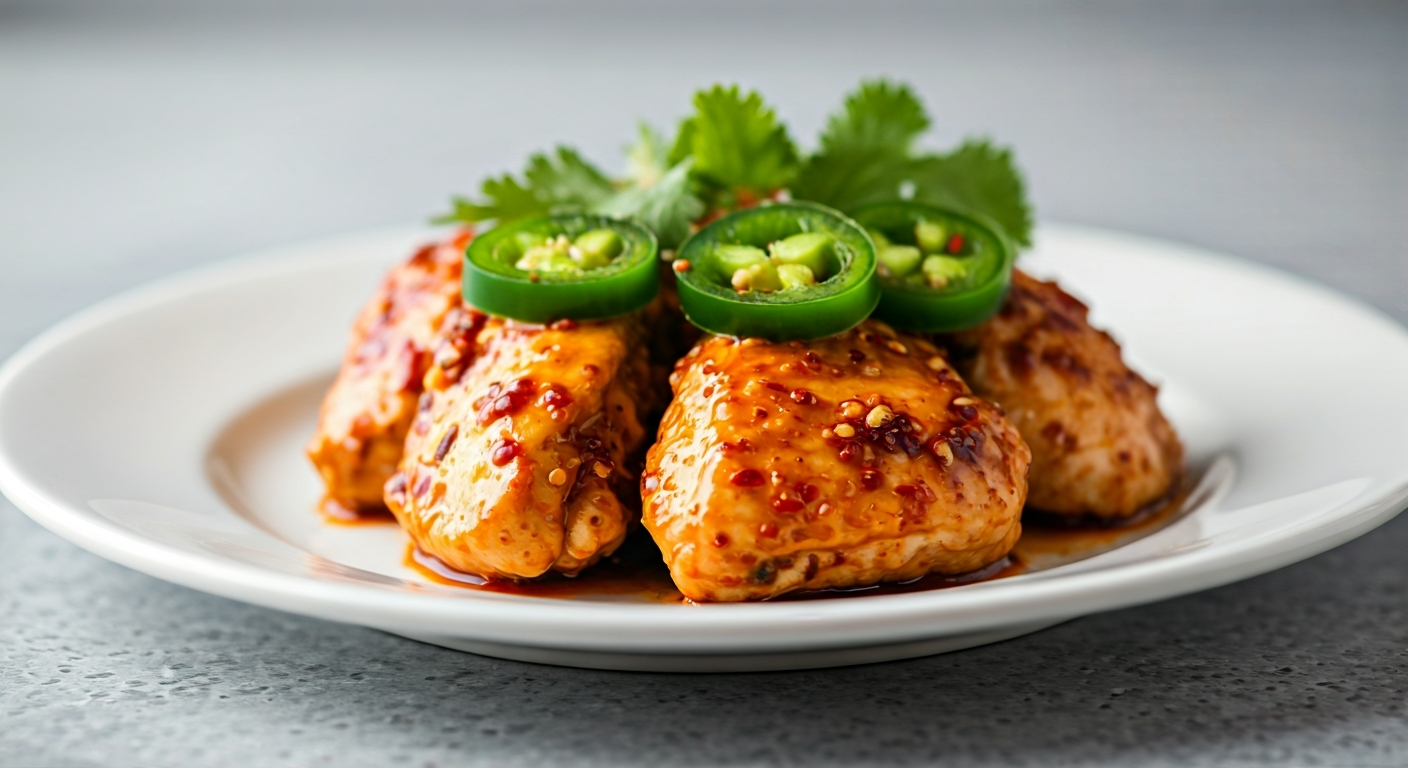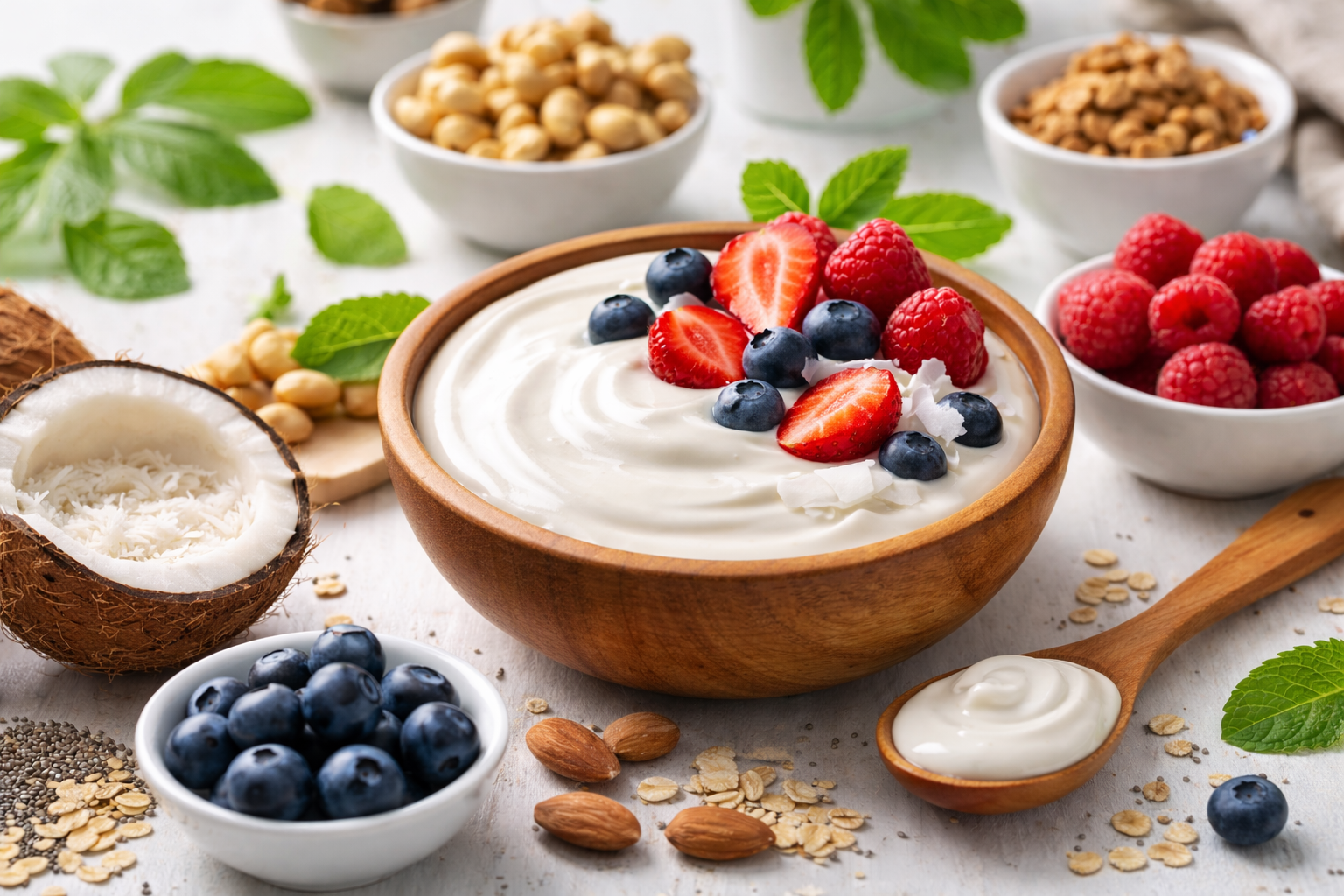Revolutionizing Cuisine: Chef-driven innovation in the era of AI
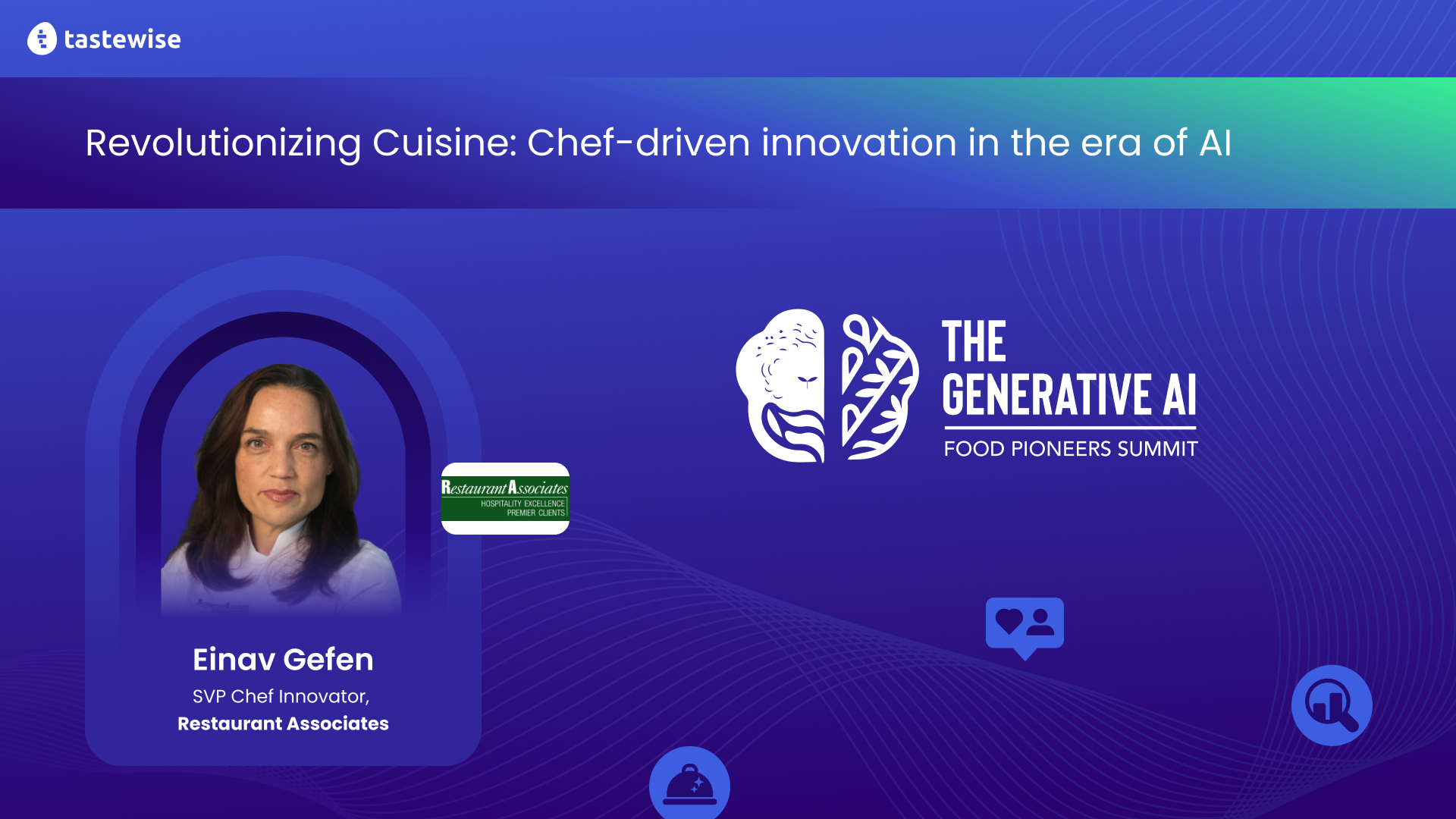
Speakers: Einav Gefen and Miriam Aniel
Einav Gefen, SVP Chef Innovator at Restaurant Associates, and Miriam Aniel Oved, Head of Marketing Communications at Tastewise, discuss the impact of AI on the food service industry. Einav emphasizes the importance of understanding AI and its potential, while also addressing the fear and challenges it presents. She also highlights the role of AI in improving efficiency, menu creation, and dish creation, but acknowledges that it may significantly change certain jobs. The conversation also touches on the role of AI in sustainability, emphasizing the need for collaboration and a change in mindset to create a more sustainable future.
[00:00:00 – 00:04:00]
Miriam: We are going to be exploring what it means to revolutionize cuisine, what chef-driven innovation in the era of AI looks like. We are joined today by Einav Gefen, SVP Chef Innovator at Restaurant Associates. Prior, she was a corporate executive chef at Unilever North America. And we’re very much looking forward to hearing her perspective on all things chef innovation, AI technology and what it means to bring in this moment in time into the kitchen. Einav, we were chatting just before this around how you spoke at our first summit a few years ago. So, it’s going to be great to catch up with you in this space and hear everything that’s new in your world.
As we get started, I would love if you could share with us a little bit about what brought you to the world of food. You are a career chef innovator, you’ve been in the kitchen for a long time. So, I would love to hear what brought you originally to the world of food and then if you could tell us a little bit about what the last couple of years has looked like for you professionally and what your current role at Restaurant Associates is today.
Einav: Always great be on the platform with you guys. Love, love, love data. So, for me, the past few years have been a whirlwind, not only personally with a career move from Unilever back closer to food with Restaurant Associates. The people online that don’t quite know what Restaurant Associates is, we are a sector of Compass. Compass is the biggest hospitality group globally, headquartered in London. But the lion’s share of our market, about two-thirds of our P&L and market is the U.S. Restaurant Associates is one of 20 in some sectors and we operate as separate entities.
We all belong to the bigger mothership, but all the sectors have their own P&L, we’re our own independent companies. And sometimes we actually even compete against each other, which keeps us all on our toes. But RA is the higher culinary arm. We do serve a lot of big clients in our business, pretty much divvied up between three main pillars. One is what we call B&I, Business and Institution, so everything that has to do with food at the office, at your business place, it doesn’t matter if it’s the cafeteria or the executive dining room or a little bit of those retail places, opportunity to purchase food, the grab and goes, the micro kitchens.
[00:04:00 – 00:07:00]
Einav: The second pillar of our three-legged stool, is our cultural centers and restaurants. We have museums and restaurants. Coincidentally, the number one restaurant in New York City, Tatiana, is ours, plus some others. And the third leg of our stool is catering, we have five catering companies throughout the nation where we do events, but also dabbling in B&I or food delivery into smaller locations that may not have the infrastructure of a kitchen. So, safe to say that my world of food is pretty interesting. No two days are alike. We are in ginormous growth since COVID and it’s pretty impressive.
But we know that food is the drawer. On the parallel side to that is just the huge changes in the industry, anywhere between the challenges that COVID has exposed from supply chain to labor issues, lack of skilled labor, no return of labor into the business, kitchen efficiency and all the way to technology and adaptation of technology, AI being at the spearhead of that, and assessing what it is. And you asked me how it looks like and I don’t know yet. I think we are very much in the beginning phase of evaluating what AI can be for the food service industry. The potential is huge, but there is a lot of fear of what that may mean, how it may evolve, what jobs it may take and all that jazz.
Miriam: It sounds like your experience really brings this business acumen and this kitchen culinary creativity piece together. And it sounds like you’ve made some career choices which are able to reflect both of those things in the last couple of years. Tell me more about your perspective on AI; you touched a little bit on the fear, you touched a little bit on the change, but tell me how your past and current roles have really influenced how you’re thinking about AI and then we can explore more as we go from there.
[00:07:00 – 00:09:00]
Einav: Because I am closer to the startup nation with PeakBridge and working with companies like Tastewise, AI is not news to me at all. I think what is new or evolving is how AI will become a dominant part in our industry. The biggest hurdle is that the rule of garbage in/garbage out applies to AI. At the beginning, there is like, “Okay, what is it? Are robots going to take over?” I always find myself needing to separate the discussions from robots and that component of technology and what AI is. And even my CEO, Ed Brown, who just finally understood really the depth of AI and what it can do, he calls himself a new converter to AI. We all need to understand that AI is not going to go away. This is not a cronut trend, it’s not a dish that today, everybody is like lining up to try and tomorrow it’s going to fizzle away.
AI is here to stay, it will evolve, it will advance, it will impact the industry and I think it will be really naive and probably not business savvy to bury your head in the sand and not to get a grip of it early on. And, by getting a grip on it, I’m not meaning necessarily adopting anything yet, but it’s understanding what it brings to the industry. And the way I see that, I see a huge shift because of COVID and during COVID due to the higher rate of adaptation or willingness to adopt new technologies. You have more people in the industry, not only chefs, but unit managers and quality assurance people and procurement people starting to lean on data and data-enabled decisions.
The predecessor to that is that the systems that accumulate or collate data right now are very fragmented, mainly when you zoom out of a unit or a restaurant and just a receipt and what I’m getting in and what I’m pushing out, which is kind of like the lowest hanging fruit.
[00:09:00 – 00:11:00]
Einav: If you zoom out and look at the distribution systems and the big players and the big broad-liners, they are not sharing their data at all. They never were thrilled of sharing what we call SSD, Secondary Sales Data. I think the minute AI will start correlating all those datapoints up to what it is that I’ve ordered, how much have I sold, what my menu cycles look like, what is the population at my unit, on a Monday versus a Wednesday, on a lunch versus a breakfast, and start influencing how we plan for a week, for a month, for a quarter based on really hard data.
This is where we’re going to see the huge impact of AI I think as an initial point and, down the road, on menu creation, dish creation. And I think that will be day two, there needs to be an introduction and adaptation of AI first, and, yes, let’s look at the elephant in the room. There will be jobs that I wouldn’t say will be eliminated in the food service, but will significantly change.
And I dwell a lot with what is the role of a chef two, three years, five years down the road if AI can generate a pretty darn accurate creative recipe. If technology companies like Tastewise gives the preliminary data and then AI generates a recipe that builds on those trends and what is buzzing or innovating in that particular moment, in that particular geography, and Cloud Chef, which is a startup out of Silicon Valley, allows me to mimic the creation of that dish throughout a multi-unit with minimal errors, then what’s the role of the chef, right? Then you’ll need one chef to maybe create or test.
[00:11:00 – 00:13:00]
Einav: I think there is a lot here to do because, at the end of the day, somebody needs to feed this data to AI of what is trending, of what is the flavor combinations that are working. AI doesn’t have the ability to taste things. At the end of the day, it’s a chef with a trained palate that will need to make the addition saying, “Eh, a little bit of this, a little less of that,” that will make it more efficient. But I definitely think that AI will play a huge role in bringing efficiencies and smart ones into the business.
Miriam: I love how we’ve covered there everything from supply chain and operation management and the business of food and getting it out there, all the way through to what the future of culinary creation actually looks like. Back to what you were saying at the start, it reminds me of in the dot-com era people were asking the question, “Okay, the internet seems really interesting, let me buy the internet.” And that wasn’t the right move. The internet wasn’t something that you buy. People were interested, they saw how it could potentially solve a problem, but they didn’t have the language yet to articulate what they actually needed and how to engage with it.
And I think we’re in a similar moment with AI. People are seeing AI, they’re excited about it, they know it’s not a trend, but they are not quite sure how to actually integrate it into their world. So fear can fill that gap and I think what you’re explaining helps us visualize and envision a world of food, where AI, for all of its artificial intelligence, doesn’t have that sensory and emotional intelligence that can fill the gap. So, how do we create a world where humans and technology co-create and create something that really works from the workflows all the way through to the product?
That brings me to my next question, and I want to touch on how can we balance tradition and technology. How can chefs maintain, that creative integrity, that creative identity when we’re integrating AI insights into their culinary practices? You just shared about feeding data into Cloud Chef. But what does the creative integrity of a chef look like in this moment? What’s important to you as a chef right now to hold on to in this moment of change?
[00:13:00 – 00:15:00]
Einav: I think, at least at the beginning, AI will first bring efficiencies and actually will free the chef to be more creative. At the moment, a head chef of a unit of a restaurant probably 20% of their time, if they’re lucky, is in a kitchen really creating, really cooking, really thinking about it. But most of it is like scheduling the people and looking at the receipt and if they are physically responsible, looking at which distributor has the cheapest apples with the best quality and due diligence.
If AI will take that away and the menu cycling and the programming, it will leave me more room to think like, “Okay, here is my population.” Maybe it’s a law firm with x amount of foreigners from a certain cuisine and I can plug more into that cuisine. Maybe I can free my mind to think, “Oh, next month is the Olympics, what do I want to do as a promotion to really recognize France?”
Right now, when you’re in the trenches and you’re dealing with the day-to-day, I think AI will ease the load on the day-to-day. And I think people need to understand that and not be afraid and say, “Oh, my God, it’s gonna take my job.” Are there opportunities there for AI to start creating recipes? A hundred percent yes. And they’re becoming more and more accurate. But, again, you need a human at the end of that to cook it, to taste it, to tweak it, to decide if it’s a yay or nay.
[00:15:00 – 00:17:00]
Einav: Over a decade ago I played with Watson, and the recipes it created were horrific. We’re like, “Yeah, okay, I’m good. Probably until I retire I’ll be okay.” But I think it’s evolving in leap years now. And I think chefs will find themselves needing to be a little bit more savvy with technology and redefining creativity. But I really think if we shift the paradigm and the mindset and say, “Okay, it will free me to explore more, to see what other chefs are doing to try different things, look at different ingredients and have AI help me feed those ingredients in and see what it can create and take a lot of the research,” I actually see it as an advantage, not a fear factor.
Miriam: I love that. Something we think a lot about at Tastewise is how we can democratize access to these tools across organizations when you’re talking about the distributor and the chef who’s in the kitchen that isn’t just cooking and is also looking at the receipts and thinking about the next meeting and all of that. How do we get all of these people to speak the same language, and adopt the same change mentality to be able to work more effectively together to then unlock that creativity for everybody. That’s really top of mind for us at Tastewise. And that’s what we’re thinking through with our solutions. I know a lot of the people in the room today are thinking about the same thing.
Let’s take a quick pivot, although I do think it’s part of the same conversation, I would love to explore sustainability with you. I know that’s something that really matters to you both personally and professionally. And I would like to think, as we’re creating this shared language in the industry, sustainability is going to have to be one of our top focuses. So, tell me about your perspective on AI and what it can mean for sustainability as we continue to create the future of food.
[00:17:00 – 00:20:00]
Einav: First of all, I think sustainability, much like AI, it’s a big word. And I’m privileged to be extremely close to the innovations and not only that I love it in my personal life, I get to do it for a living as well now. So, I am very grateful. But, because I’m close to it, it’s less threatening. But I think there is a slew of people in the industry to whom either sustainability and/or AI are big words. “What is it?” “What does it mean to me?” So, I think there is a job to do — I wouldn’t say dumb it down, but really break it down to a more granular thing so the majority of people can understand what AI is.
But this is not the threat, it’s sustainability. There is not one thing that will save the planet, it’s an accumulation of a lot of things and a butterfly effect to really make an impact. And this is what I keep saying on the global level at Compass as well, I coach a global culinary forum, because when you go down to the units and you talk to the chefs that are in the trenches day-to-day, they really don’t grasp if they do something small how possibly can that add to something bigger.
And you are not going to boil the ocean. I’m not asking each and every one to start recycling, stop serving everything that is wrapped in a single wrap, act on food waste, label carbon emission and buy things that are only animal welfare.
[00:20:00 – 00:22:00]
Einav: There are things that will need to come from bigger entities and there are things that we can do in our day-to-day. All I’m asking is choose one thing that is important to you and important to your client and act on it. Let’s start with one. I’m very much of the Kaizen mentality of you win by inches. If each one will walk a couple of inches, the industry as a whole will walk miles. But I also think there is a call to action here. And I said that at a conference I was privileged to speak in at Upfield in the Netherlands a couple of weeks ago that, at the end of the day, the things that are really impacting the environment via sustainable practices tend to cost more money.
It doesn’t matter if it’s a new product that I can use that maybe is from upcycled materials that would have been in a landfill or a new packaging that is more environmentally friendly or whatever that is, it tends to come with a higher sticker price as it comes into market. So, my client may say, “Wait, it’s important, but not that important because we need to tighten the belt.” Everybody in this industry has to hold in and say, “Let’s be less greedy. And if it’s really important for us, let’s all decide to earn a little less for the sake of doing the right thing.” And I think that’s the biggest message.
[00:22:00 – 00:24:00]
Einav: Sustainability is extremely important. I think we’re all salami slicing the damage we’re doing to the environment. And it doesn’t matter if it’s the plastic belt the size of Texas floating in the ocean or the diminishing species in the sea or land that are being over processed and over poached or, or the rising temperatures or the horrific torrential rains and mudslides.
Mother Earth is yelling at us and you can argue that it’s our doing or a natural cycle, it doesn’t matter. We’re definitely not helping it. So, did we or didn’t we create it? We can argue at a different time. The reality is that we can slow it down and we can minimize the impact, but we needed to act yesterday. And, in order to do that, it will take more than one entity in our industry to be proactive. We really have to hold hands throughout the whole system up and down the stream and make sure that we’re doing something impactful.
Miriam: I think that’s a crucial point. And the marketer in me is thinking this is a messaging problem in a lot of ways. How do we get everybody across the chain to hear the same message in a way that resonates with them? At Tastewise we think about consumer motivations and consumer needs and creating products that speak to people directly to where they are in their lives and what they’re looking for. The same thing has to happen for sustainability and also for AI adoption. That leads me to my next question. We think about all the different stakeholders in food and beverage and ourselves, as consumers, are also a stakeholder. I like that you’re holding everyone here accountable because we all are accountable. It’s all our responsibility.
[00:24:00 – 00:26:00]
Miriam: I’m wondering if you think, in this particular moment where sustainability needs have never been higher and AI has never been more urgent, I’m wondering where you think the onus of responsibility lies. Is it on Big Food, is it on startups and newcomers, is it on government subsidies? I know we all have individual responsibilities, but if we had to pick one segment to sort of lead the charge to get over that bump of change, where would you put your dollars if you needed to see that change move forward?
Einav: Not government. Not because they’re not doing their job, because there are slow movers and there is a lot of agendas and lobbying pulling left and right that slows it down. I think Big Food just because of the sheer impact and smaller companies, startup companies because of their agility. I think if those two powers — I wouldn’t say come together, but work towards the same goal, along with distributors that are enabling in some ways.
On the other side of the, coin, companies like Compass and I’m sure our competition as well, will be happy to adopt and bring the volume. To your prior question of how AI will link into sustainability — it will help to make really clean fact-driven decisions. And it’s not “I believe” or “I don’t believe”. It takes the subjectivity out of it and it says, “Okay, carbon, here is the labeling, here is the true cost of food from point A to point B.”
[00:26:00 – 00:28:00]
Einav: I also put a lot of emphasis on the startups. So, think about the packaging from day one that it’s not plastic or that it is compostable. Don’t tell me, “Oh, yeah well, now we are going with plastic because we’re going to go to market. It’s the fastest.” Day two will be much harder for anyone to adopt and change once you’re already set in some ways. So, I think there is also a responsibility for all those startups to dig deeper into what this may mean from a sustainability point of view and really solve for a problem rather than solve for something and tag along for a problem.
Miriam: And I think that the success of startups right now, or at least the ubiquity of startups, their ability to move fast and to be agile actually pressures Big Food into adopting solutions that are going to allow them to have that agility as well from a pure business perspective. But the next impact of that, and it should be a high priority, too, is that that then leads to further change within all of these other areas that we care about, too. So, hopefully, it’s one of those snowball effect things. We start somewhere, but, ultimately, it’ll take us to a different reality.
Einav: At the end of the day, we’re wired in a simple way — humans like to be part of success. We like new shiny things because we tend to get bored of the mundane. We like challenges. We like newness. But we also like to be part of a success story. And I think that’s where startups and definitely companies like Tastewise can prove the success in numbers, or what success can look like, I think that will be something that will propel people forward.
[00:28:00 – 00:30:00]
Miriam: I couldn’t agree more. So, that actually brings me to our final question and I’m wondering if you can offer some advice to young chefs, aspiring chefs, even mid- or late-career chefs who are looking to really bring in this change, adopt to AI, take on these new perspectives. Where would you suggest for them to start? We talked a little bit about how these concepts of AI and sustainability can be overwhelming. So, what would you — if somebody came up to you in the kitchen and said, “Hey, Einav, tell it to me straight, what do I need to do, where can I start,” what would you tell them?
Einav: I would first go to the cooking schools, the big cooking schools, the Culinary Institute of America, the Institute of Culinary Education and say, “Guys, you’re behind the train. Where are your elective courses on what sustainability means in a kitchen?” A little bit of nutrition and the role of AI, even from the theoretical, just so the new talent that comes to invest themselves in this industry, it won’t be something that is not familiar to them when they come into the workforce.
Even in high schools, it will be nice to see it — not maybe delve deep, but at least mention it. And I would say by the same token stop learning how to cook via YouTube. A kitchen is a sensorial place of hustle and bustle and cutting and tasting and smelling and feeling and texture, but it’s also food safety. We have a huge responsibility when we feed people day in/day out that they will go home not only happy about the amazing experience they had, but also safe, secure and not waking up with a tummy ache or something worse than that.
[00:30:00 – 00:33:00]
Einav: And awareness. And it can’t be a side job. It needs to be embedded and it needs to be enabled by AI, efficiencies, temperatures in the oven, in what comes in and out first, the FIFO rules. It’s not the sexy part of creating recipes and the creativity, but AI tracks data — what is in, what is out, what did we sell, the traffic in a dining room, where do I have lines, where can I bring efficiencies. I think it’s amazing for chefs to be able to think about things from a different point of view that they never thought about in a more — I wouldn’t say strategic, but tactical way.
Einav: You need tactical things and you need emotional intelligence as well because, at the end of the day, the chef will manage people, will nurture talent, will build a diverse talent in the kitchen. AI cannot do that. It just can enable things, can enable training, but the material of that training needs to come from a human at the beginning of that chain and a human at the end of that chain. And I think I would tell this new generation, “How do you see yourself at the beginning of that chain and the end of that chain — as somebody who creates or somebody who consumes? What do you need? What will help you?” I embrace this new generation that comes with more savviness towards technology.
[00:32:00 – 00:34:00]
There’s so much that we can learn, it’s almost reverse mentoring to a certain degree. So, I will tell the old generation, “Don’t be afraid, open your doors, listen to this new generation coming in, but teach the new generation the emotional intelligence, the in and out of the kitchen, what makes a kitchen successful, what it is that they need to be on the lookout for. And remember that AI is an enabler, it’s a tool. It’s a tool that will help you solve a problem. It’s not the problem and it’s not the solution. It will get you from the problem to a solution probably in a more efficient way.” So, you need to define a problem and you need to evaluate a solution. It’s a different mindset. And I will urge any culinary program and any cooking school to start defining and teaching for this mindset.
I will also urge chefs in restaurants to get adapted to this mindset and encourage their younger talent to really embed this culture and maybe learn from them as well. I look at it as a huge opportunity for the industry. I think we’re looking at amazing times for the industry and we can shake off redundancy. I would like to see more technology and innovation around equipment that is more affordable and systems that are more user friendly so a chef can enable solutions on data.
Miriam: It’s all about the perspective and what we bring to the table. As we wrap up, I just want to share, part of our team right now is in San Sebastian, Spain at the Basque Culinary Center and we’re wrapping up our first program with the Masters in Gastronomy students doing exactly what you’re describing — rethinking how we define food and the human role and the technological role within that and how can we create, as we’ve been saying, that shared language to take us to new places.
So, this couldn’t be more relevant for us. And I hope it’s relevant for everybody. This has been a fascinating conversation. Thank you, Einav.

